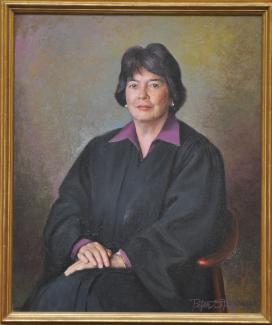Women's History Month: Patricia M. Wald
In celebration of Women’s History Month, the Office of the Attorney General (OAG) is recognizing some of the trailblazing women in law who have laid the foundation for the next generation of young female lawyers.
“In all of her work and days as a lawyer, then judge, [Patricia Wald] pursued justice with passion—heart, mind and soul. In her lifetime of achievement, she unsparingly devoted her efforts to advancing the health and welfare of humankind,” - U.S. Supreme Court Justice Ruth Bader Ginsburg
Patricia M. Wald
Judge Wald was a pioneer for women in law, serving as the first woman appointed to the U.S. Court of Appeals for the District of Columbia Circuit and the first woman to serve as its chief judge. Throughout her remarkable career as a lawyer and judge, she was a mentor to young lawyers, a champion for human rights and civil liberties, and a person who believed that the law should be used as an instrument for social progress.
Born and raised in a working-class household, Ward was the first of her family to attend college. She received a scholarship to Connecticut College for Women and graduated first in her class with a degree in government. After graduation, a Pepsi-Cola fellowship afforded her the opportunity to attend Yale Law School where she became one of only ten women in her class of 180. She graduated from Yale during a time when several law schools did not even accept applications from women.
After working briefly for some of Washington’s most prominent law firms, Ward spent ten years raising her five children at home. During this time, she continued writing and advocating on behalf of children’s rights and the rights of the disabled.
Upon returning to the legal field, she focused on bail reform and criminal justice issues. She believed in using the law and the judicial system to better the lives of vulnerable residents. For this, Barack Obama called her “one of the most respected appellate judges of her generation” when he awarded her the Presidential Medal of Freedom in 2013, the nation’s highest civilian honor.
One of Wald’s most notable contributions to criminal justice was co-authoring the book Bail in the United States, which is credited for reforming the bail system and spurring the Bail Reform Act of 1966. These problems of bail and poverty remain pertinent in the criminal justice system today. Attorney General Racine has publicly opposed the use of cash bail for misdemeanor crimes. Like Wald, he believes that this practice punishes poor defendants, their families, and their broader communities, and that being poor isn’t a crime and our bail systems shouldn’t make it one. Bail reform efforts supported by AG Racine, such as those led by Fair and Just Prosecution—an organization that brings together local prosecutors to promote and create a more fair and just criminal system—honor the legacy of Patricia Wald.

